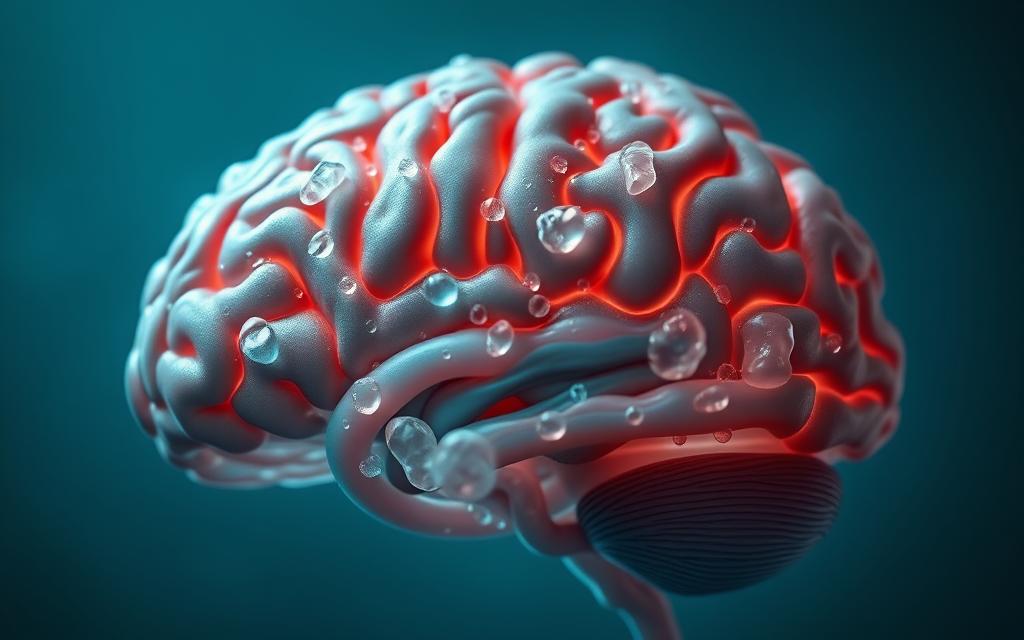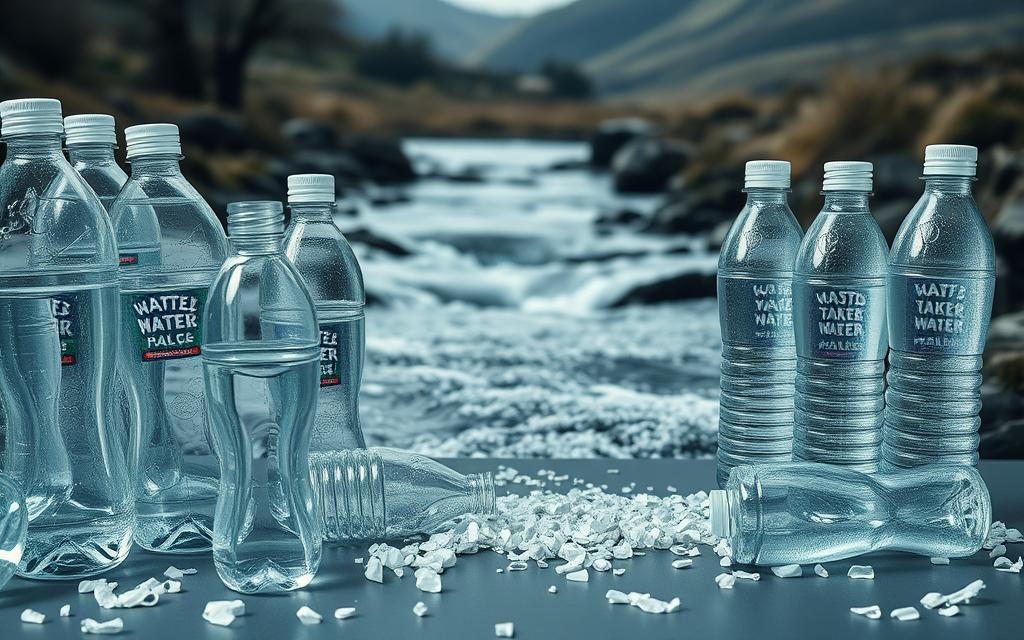Every day, we make choices that affect our health, like what we drink. Reaching for bottled water seems like a safe choice. But, studies show it might harm our brains. Microplastics in bottled water could be linked to dementia.
It’s scary to think our daily habits might lead to serious health problems. We need to think about how our actions affect our health, like with dementia and bottled water. Let’s explore these connections and how they impact our future1.
Key Takeaways
- Microplastics are increasingly found in human brains, with a 50% rise from 2016 to 2024.
- Individuals with documented dementia have 3-5 times higher levels of microplastics in their brains.
- Polyethylene constitutes 70% of detected plastic pieces in the brain.
- Drinking bottled water exposes us to concerning levels of microplastics, which could impact cognitive health.
- Switching from bottled to filtered tap water could significantly reduce our microplastic intake.
The Rise of Dementia: A Global Concern
Dementia is a growing global health issue, affecting about 55 million people worldwide. Experts predict this number could jump to 78 million by 20302. This neurological disorder is not just a challenge for those diagnosed but also for caregivers and healthcare systems.
Older adults, over 65, are at higher risk, with studies showing 20-30% may face dehydration2. Those with dementia often forget to drink, leading to higher dehydration rates than others2.
Alarmingly, up to 40% of dementia patients may not feel thirsty, raising their dehydration risk2. Dehydration can worsen confusion and cognitive symptoms, leading to more hospitalizations. This puts a strain on healthcare resources2.
It’s crucial to understand these statistics and trends to develop effective prevention and support strategies as numbers increase.
Understanding Dementia: Causes and Symptoms
Dementia is a group of symptoms that show a big drop in brain function. It affects memory, thinking, and how we interact with others. It’s not one disease but a syndrome caused by many things, like Alzheimer’s disease, the most common type3.
After Alzheimer’s starts, people usually live about 8 years. But, some can live up to 20 years after being diagnosed3.
Signs of dementia include memory loss, trouble speaking, and poor judgment. As dementia gets worse, it can affect basic things like breathing and digestion3. Things like pollution in water can raise the risk of brain diseases, leading to cognitive decline4. For example, water with low magnesium can increase dementia risk by 25%5.
People living in cities and those over 65 face higher risks5. The way dementia shows up and gets worse can vary a lot. This depends on a person’s health, including any health problems they already have3.
Learning about dementia’s causes and symptoms helps us make better choices for our health and water.

The Connection Between Water Quality and Cognitive Health
The water we drink is key to our health, and it affects our brain health too. Bad water can have harmful stuff that hurts our brain, leading to dementia. For instance, almost 10 million new dementia cases are reported yearly, with Alzheimer’s being a big part of that6.
In 2019, about 55 million people worldwide had dementia. This shows a big problem with brain health6.
Water quality is important for understanding how bad stuff in water can harm our brain. A study looked at 10 studies about water and brain health in older adults. It found that aluminum might hurt brain health, but silica and calcium might help6.
In the U.S., even though water rules are in place, we still face problems with water contaminants7.
The Flint water crisis showed us how bad lead in water is, hurting kids the most7. To protect our brain health, we need to focus on better water quality. This can help lower the risk of dementia.

Impact of Microplastics on the Brain
Recent studies have found microplastics in human brains, raising big concerns. On average, a spoonful of these tiny plastics and nanoparticles is found in our brains. People with dementia have even more, up to five times, which makes us wonder about their effect on our minds89.
Recent Findings on Microplastics in Human Brains
Research on brain tissue after death shows disturbing facts. Those with dementia have up to ten times more microplastics in their brains than healthy people. The brain has 7 to 30 times more microplastics than other organs like the kidneys and liver89.
How Much Plastic is in Our Brains?
Over the last eight years, more microplastics have been found in brain samples. Researchers have identified 12 different types of plastics in these tissues. Polyethylene is the most common. Switching to tap water from bottled water can cut down microplastic intake from 90,000 to 4,000 particles a year89.

The Role of Battled Water in Plastic Consumption
Bottled water is common in many homes, but it has hidden dangers. A liter of bottled water can have about 240,000 tiny pieces of plastic10. Most of these, around 90%, are nanoplastics that can get into our cells and cause harm11.
This high plastic use worries us about its effects on our brains. It’s not just a small issue; it’s a big problem for our health.
Studies show bottled water has more plastic particles than we thought. They found seven types of plastic, like polyamide and PET10. But there are also many plastics we don’t know about yet.
We get these plastics mainly from what we eat and drink. Bottled water is a big part of this problem. When we store bottled water in hot places, it releases even more plastic particles11.
To live healthier, we should use less bottled water. This can help cut down on plastic use and protect our health.

| Plastic Source | Average Number of Plastic Particles | Types of Plastic Detected |
|---|---|---|
| Bottled Water | 240,000 particles per liter | Polyamide, PET, and others |
| Food and Drinks | Varies | Various (not all identified) |
Dementia and Battled Water: The Alarming Link
The link between dementia and bottled water is alarming. It raises questions about our brain health. Studies show that bottled water may expose us to more microplastics, which are linked to dementia. This is a serious issue because people with dementia have up to 10 times more microplastics in their brains than others12.
Those with dementia also have three to five times more microplastics and nanoplastics in their brains than healthy people13. Since bottled water is a big source of microplastics, our choice of water is crucial.
How Bottled Water Contributes to Microplastic Intake
Bottled water is a major source of microplastics in our diet. Switching to tap water could cut our yearly intake from 90,000 particles to 4,00012. The levels of microplastics in brain samples have risen sharply over eight years, making it time to change our water habits13.
Studies Highlighting the Risks of Plastic Exposure for Dementia Patients
Research shows the dangers of microplastic exposure for dementia patients. The human brain usually has about a spoonful of microplastics and nanoplastics12. People with dementia have much higher levels of these in their brains than those without the disease14.
The increase in microplastic levels in brain samples over recent years is alarming12.
Environmental Impacts: Water Pollution and Health
Water pollution is a big problem that hurts our health. Sadly, about 2.2 billion people worldwide don’t have safe drinking water in 202215. This lack of access leads to many health problems, as over 1.4 million people die each year from bad sanitation and unsafe water15. Also, over 2 billion people live in countries with not enough water15.
Our drinking water is often contaminated. Around 1.7 billion people drink water with fecal matter15. Chemical pollutants in water can cause serious health issues like cancer and brain problems15. Contaminated water also spreads diseases like cholera and typhoid15.
Water quality problems are linked to brain disorders. Research shows a link between bad water and more dementia cases16. We need to fight for better policies to protect our water and ensure everyone has safe drinking water.

Steps We Can Take to Reduce Plastic Intake
We can all play a part in fighting microplastic pollution. One big step is to choose tap water over bottled water. This simple change can greatly reduce our exposure to microplastics. Studies show that switching to tap water can cut our microplastic intake from about 90,000 particles a year to just 4,000171819.
Switching from Bottled to Tap Water
Choosing tap water helps us reduce microplastic intake and promotes caring for our planet. The bottled water industry is a big source of plastic waste, releasing millions of microplastics into our environment18. By using tap water, we can make a difference and stay hydrated.
Choosing Plastic-Free Options
We can also cut down on plastic by picking products with little or no plastic packaging. Using stainless steel or glass containers for drinks and meals reduces our plastic use. Supporting local efforts to improve water quality and access ensures everyone can have clean tap water. Together, these steps lead to a healthier, more sustainable future for us all.

Processed Foods and Their Connection to Plastic Consumption
Our food choices greatly affect our health. One big concern is the amount of microplastics in processed foods. For example, chicken nuggets can have up to 30 times more microplastics than fresh food20. This is very worrying for our health and well-being.
Studies show we eat between 78,000 and 211,000 microplastic particles every year through food and drinks21. Often, these plastics are from the containers our food is stored in. It’s alarming that brain tissue from people with dementia has much more microplastics than those without22.
This link between processed foods and microplastics makes us think about what we eat. We need to choose healthier foods to reduce plastic and protect our brains. Making small changes in our diet can help us avoid harmful substances and improve our health.

It’s important to think about how much microplastics are in processed foods. We should look for healthier options to cut down on plastic and keep our brains healthy. Simple changes in our diet can help us avoid harmful substances and improve our health.
Research on Aluminum in Drinking Water and Cognitive Decline
Recent studies have found a worrying connection between aluminum in drinking water and brain decline. It shows that drinking water with more than 0.1 mg of aluminum a day can double the risk of dementia. This is seen in the PAQUID study, which followed nearly 4,000 older adults in Southwest France23.
Research also found that drinking water with 0.1 mg of aluminum a day can lead to more mental decline24. This shows a clear link between aluminum in water and brain problems14. It’s crucial to watch the aluminum and silica levels in our water, as they can harm our brain health over time14.
Looking at brain function over 15 years, studies found that more aluminum means higher risks of dementia and Alzheimer’s24. It’s clear that knowing the quality of our drinking water is key. Many people showed a big drop in brain skills due to aluminum intake23.
Maintaining Mental Health in a Plastic-Polluted World
As plastic pollution grows, we must focus on our mental health. Microplastics have been found in human brains, showing those with dementia have more than others25. This highlights the need to cut down on these harmful substances.
Eating well is key to keeping our minds sharp. Foods high in microplastics, like ultra-processed foods, can lead to depression and anxiety26. Choosing whole foods over processed ones helps us stay healthy.
Regular exercise is good for both body and mind. It can help remove plastic compounds from our bodies25. Being active keeps our minds clear and focused.
Knowing how plastic pollution affects us is crucial. Simple changes, like using filtered tap water instead of bottled, can make a big difference25. Supporting better options helps us live in a healthier, more sustainable world.
Conclusion
Looking at the link between dementia and bottled water, we see how our surroundings affect our brain health. The scary news about microplastics in dementia patients’ brains shows we must change our drinking habits. Choosing safer water can greatly help our mental health.
Studies show that dementia patients have up to 10 times more microplastics in their brains than healthy people8. Bottled water is a big part of this problem. Switching to tap water can cut down our microplastic intake a lot. Every choice we make helps our planet and our brains.
We need to work together to spread the word about microplastics and clean water. By doing so, we can create a better future for everyone. Let’s fight against dementia and other health problems caused by plastic.
FAQ
How can bottled water affect cognitive health?
Bottled water might contain microplastics. These have been linked to brain problems and a higher risk of dementia. People with dementia often have more microplastics in their brains than healthy people.
What are the key symptoms of dementia?
Dementia symptoms include memory loss and trouble speaking. It also includes poor judgment and changes in social skills. It’s a group of conditions, like Alzheimer’s disease, that cause cognitive decline.
Why is water quality crucial for cognitive health?
Water quality is key for our brain health. Bad water can harm our brain function. This might raise the risk of dementia.
What have studies shown about microplastics in the brain?
Studies found high levels of microplastics in human brains. People with dementia have three to five times more than those without brain problems.
How does bottled water contribute to plastic pollution?
Bottled water is a big source of microplastic pollution. It often leads to more plastic consumption than tap water. The waste from plastic bottles adds to this problem.
What steps can we take to reduce our plastic intake?
We can cut down on plastic by drinking tap water instead of bottled. Using products without plastic and choosing reusable containers helps too. Supporting local efforts to improve water quality is also important.
How are processed foods related to plastic intake?
Processed foods often have more microplastics, which can harm our health. Eating less of these foods can reduce our plastic intake and its risks.
What recent research suggests about aluminum exposure and cognitive decline?
Research links aluminum in drinking water to brain decline, including Alzheimer’s. It’s vital to keep an eye on aluminum and silica levels in our water for brain health.
How can we maintain our mental health amidst plastic pollution?
To keep our minds healthy, eat well, stay active, and avoid harmful substances. Knowing about environmental impacts and pushing for better choices is also key for our well-being.
